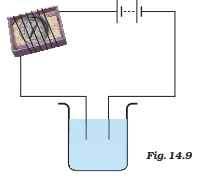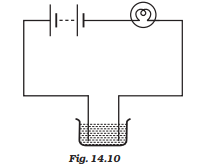NCERT Solutions Class 8 Science
The NCERT Solutions in English Language for Class 8 Science Chapter – 14 (Chemical Effects of Electric Current) has been provided here to help the students in solving the questions from this exercise.
Chapter – 14 (Chemical Effects of Electric Current)
1. Fill in the blanks.
(a) Most liquids that conduct electricity are solutions of ______________ and ______________.
(b) The passage of an electric current through a solution causes ______________ effects.
(c) If you pass current through copper sulphate solution, copper gets deposited on the plate connected to the ___________terminal of the battery.
(d) The process of depositing a layer of any desired metal on another material by means of electricity is called _________.
Answer –
(a) Most liquids that conduct electricity are solutions of acids, bases and salts.
(b) The passage of an electric current through a solution causes chemical effects.
(c) If you pass current through copper sulphate solution, copper gets deposited on the plate connected to the negative terminal of the battery.
(d) The process of depositing a layer of any desired metal on another material by means of electricity is called electroplating.
2. When the free ends of a tester are dipped into a solution, the magnetic needle shows deflection. Can you explain the reason?
Answer – The deflection occurs because the circuit becomes complete since free ends of the tester are dipped in a solution. The solution is certainly a conducting solution. This is the reason why the compass needle shows a deflection.
3. Name three liquids, which when tested in the manner shown in Fig.14.9, may cause the magnetic needle to deflect.

Answer –
I. Saltwater
II. Lemon juice
III. Vegetable oil
These liquids can be taken in a beaker to show the passage of electricity, as they will show a deflection in the magnetic needle.
4. The bulb does not glow in the setup shown in Fig.14.10. List the possible reasons. Explain your answer.

Answer – If the bulb does not glow, it means that electricity is not passing through it. So, the possible reasons can be
- Liquid is a poor conductor of electricity
- Bulb is defective or fused
- Battery may be dead
- The wires might not be conducting
- The connection of wires might be loose
5. A tester is used to check the conduction of electricity through two liquids, labelled A and B. It is found that the bulb of the tester glows brightly for liquid A, while it glows very dimly for liquid B. You would conclude that
(i) liquid A is a better conductor than liquid B.
(ii) liquid B is a better conductor than liquid A.
(iii) both liquids are equally conducting.
(iv) conducting properties of liquid cannot be compared in this manner.
Answer – (i) liquid A is a better conductor than liquid B.
6. Does pure water conduct electricity? If not, what can we do to make it conduct?
Answer – Pure water does not conduct electricity, as it does not contain any type of salt. Adding a small amount of Common salt (Sodium Chloride, i.e., NaCl) will turn the water into a conducting medium.
7. In case of a fire, before the firemen use the water hoses, they shut off the main electrical supply for the area. Explain why they do this.
Answer – The water used by the fireman may be conducting. Thus, It may cause electric shock to the fireman. Therefore, to save himself from getting electric shock, he shuts down the electric supply for the area.
8. A child staying in a coastal region tests the drinking water and also seawater with his tester. He finds that the compass needle deflects more in the case of seawater. Can you explain the reason?
Answer – Sea water contains more dissolved salts than the drinking water. Therefore, it is more conducting than the drinking water. Due to this reason, the compass needle deflects more in seawater than in the drinking water.
9. Is it safe for the electrician to carry out electrical repairs outdoors during heavy downpours? Explain.
Answer – No, It is not safe for the electrician to carry out electrical repairs during heavy downpour. It is because during heavy downpour there is a higher risk of electrocution.
10. Paheli had heard that rainwater is as good as distilled water. So she collected some rainwater in a clean glass tumbler and tested it using a tester. To her surprise, she found that the compass needle showed deflection. What could be the reasons?
Answer – Rainwater is composed of a certain percentage of dissolved salts making it conductive. This results in the deflection of the compass.
11. Prepare a list of objects around you that are electroplated.
Answer – Pots of metals, bath taps, ornaments, rims of vehicles, handle bar of cycles and motor cycles, kitchen gas burner, bottom of cooking utensils, handles of doors, tin cans are the some objects around us that are electroplated.
12. The process that you saw in Activity 14.7 is used for the purification of copper. A thin plate of pure copper and a thick rod of impure copper are used as electrodes. Copper from the impure rod is sought to be transferred to the thin copper plate. Which electrode should be attached to the positive terminal of the battery and why?
Answer – Copper is positively charged, so it will get attracted to the negative electrode. Because positive charges attract negative charges As copper ions are deposited on the copper plate, the thin copper plate must be connected to the negative terminal of the battery. Hence, the impure copper rod is connected to the positive terminal of the battery.

Leave a Reply